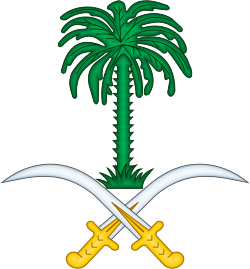Custodian of the Two Holy Mosques
Custodian of the Two Holy Mosques (abbreviation CTHM; Arabic: خَادِمُ ٱلْحَرَمَيْنِ ٱلشَّرِيفَيْنِ, Khādim al-Ḥaramayn aš-Šarīfayn), Servant of the Two Noble Sanctuaries or Protector of the Two Holy Cities, is a royal style that has been used by many Muslim rulers, including the Ayyubids, the Mamluk Sultans of Egypt, the Ottoman Sultans, and in the modern age, Saudi Arabian kings. The title was sometimes regarded to denote the de facto Caliph of Islam,[1] but it mainly refers to the ruler taking the responsibility of guarding and maintaining the two holiest mosques in Islam: Al-Haram Mosque (Arabic: اَلْمَسْجِدُ ٱلْحَرَامُ, romanized: Al-Masjid al-Ḥarām, "The Sacred Mosque") in Mecca and the Prophet's Mosque (Arabic: اَلْمَسْجِدُ ٱلنَّبَوِيُّ, romanized: Al-Masjid an-Nabawī) in Medina,[1][2] both of which are in the Hejazi region[3] of the Arabian Peninsula.
| Custodian of the Two Holy Mosques | |
|---|---|
| خَادِمُ ٱلْحَرَمَيْنِ ٱلشَّرِيفَيْنِ Khādim al-Ḥaramayn aš-Šarīfayn (in Arabic) | |
| Details | |
| Style | CTHM, Your Majesty |
| First monarch | Salahuddin Al Ayyubi |
| Residence | King's Palace, Riyadh, currently Al Yamamah Palace |
History
It is believed that the first person to use the title was Saladin of the Ayyubid dynasty.[4]
After defeating the Mamluks and gaining control of the Mecca and Medina in 1517, the Ottoman Sultan Selim I adopted the title. Rather than style himself the Ḥākimü'l-Ḥaremeyn (Arabic: حَاكِمُ الْحَرَمَيْن, Ruler of The Two Holy Cities), he accepted the title Ḫādimü'l-Ḥaremeyn (Arabic: خَادِمُ الْحَرَمَيْن, Servant of The Two Holy Cities).[5][6][7] This title was used by all subsequent Ottoman Caliph Sultans until Mehmed VI (1861–1926), the last.
The first King of Saudi Arabia to assume the title was Faisal bin Abdul Aziz (1906–1975). His successor Khalid did not use the title,[4] but the latter's successor Fahd did, replacing the term "His Majesty" with it.[8] The current king, Salman bin Abdulaziz Al Saud, took the same title after the death of King Abdullah, his half brother, on 23 January 2015.[2]
See also
- ʾAmīr al-Muʾminīn (Arabic: أَمِير الْمُؤْمِنِين, "Commander of the Believers")
- Holy city
- Jerusalem Islamic Waqf
References
- Wood, Paul (August 1, 2005). "Life and legacy of King Fahd". BBC News. Retrieved April 6, 2011.
- "Custodian of the Two Holy Mosques King Abdullah bin Abdulaziz". The Saudi Embassy in Tokyo, Japan. Archived from the original on January 20, 2011. Retrieved April 6, 2011.
- Merriam-Webster's Geographical Dictionary. 2001. p. 479. ISBN 0 87779 546 0. Retrieved 2013-03-17.
- Fakkar, Galal (27 January 2015). "Story behind the king's title". Arab News. Jeddah. Retrieved 27 June 2016.
- Freidun Emecen, Selim I, TDV İslam Ansiklopedisi, Vol.36, p.413-414. (In Turkish)
- İlber Ortaylı, "Yavuz Sultan Selim", Milliyet (In Turkish)
- İlber Ortaylı, "Surre alayı Topkapı Sarayı’ndan geçiyor", Milliyet, 20 April 2008 (In Turkish)
- "Fahad played pivotal role in development". Gulf Daily News. 2 August 2005. Retrieved 2 February 2013.

.svg.png)